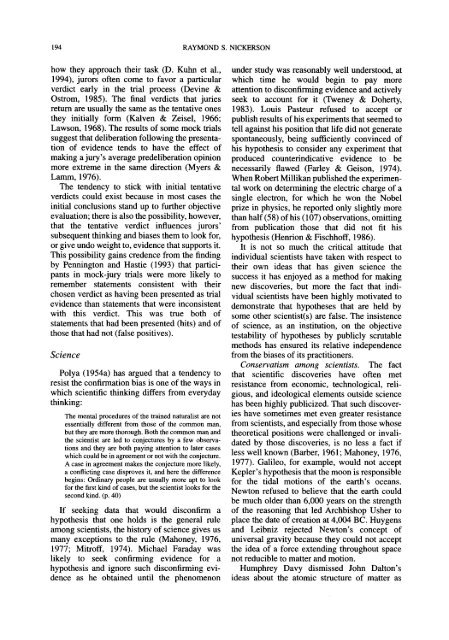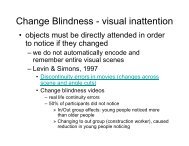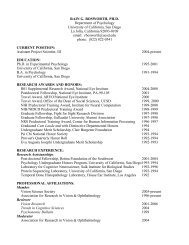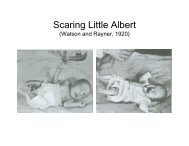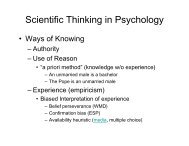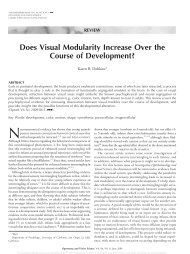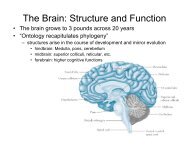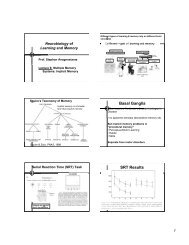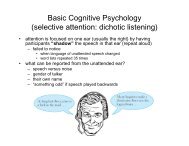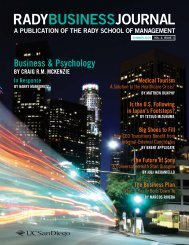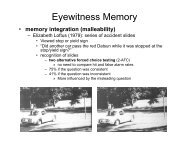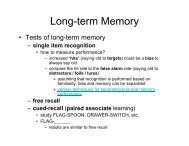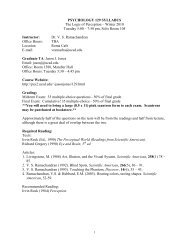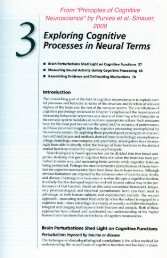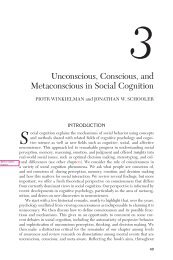Confirmation Bias: A Ubiquitous Phenomenon in Many Guises
Confirmation Bias: A Ubiquitous Phenomenon in Many Guises
Confirmation Bias: A Ubiquitous Phenomenon in Many Guises
You also want an ePaper? Increase the reach of your titles
YUMPU automatically turns print PDFs into web optimized ePapers that Google loves.
194 RAYMOND S. NICKERSON<br />
how they approach their task (D. Kuhn et al.,<br />
1994), jurors often come to favor a particular<br />
verdict early <strong>in</strong> the trial process (Dev<strong>in</strong>e &<br />
Ostrom, 1985). The f<strong>in</strong>al verdicts that juries<br />
return are usually the same as the tentative ones<br />
they <strong>in</strong>itially form (Kalven & Zeisel, 1966;<br />
Lawson, 1968). The results of some mock trials<br />
suggest that deliberation follow<strong>in</strong>g the presentation<br />
of evidence tends to have the effect of<br />
mak<strong>in</strong>g a jury's average predeliberation op<strong>in</strong>ion<br />
more extreme <strong>in</strong> the same direction (Myers &<br />
Lamm, 1976).<br />
The tendency to stick with <strong>in</strong>itial tentative<br />
verdicts could exist because <strong>in</strong> most cases the<br />
<strong>in</strong>itial conclusions stand up to further objective<br />
evaluation; there is also the possibility, however,<br />
that the tentative verdict <strong>in</strong>fluences jurors'<br />
subsequent th<strong>in</strong>k<strong>in</strong>g and biases them to look for,<br />
or give undo weight to, evidence that supports it.<br />
This possibility ga<strong>in</strong>s credence from the f<strong>in</strong>d<strong>in</strong>g<br />
by Penn<strong>in</strong>gton and Hastie (1993) that participants<br />
<strong>in</strong> mock-jury trials were more likely to<br />
remember statements consistent with their<br />
chosen verdict as hav<strong>in</strong>g been presented as trial<br />
evidence than statements that were <strong>in</strong>consistent<br />
with this verdict. This was true both of<br />
statements that had been presented (hits) and of<br />
those that had not (false positives).<br />
Science<br />
Polya (1954a) has argued that a tendency to<br />
resist the confirmation bias is one of the ways <strong>in</strong><br />
which scientific th<strong>in</strong>k<strong>in</strong>g differs from everyday<br />
th<strong>in</strong>k<strong>in</strong>g:<br />
The mental procedures of the tra<strong>in</strong>ed naturalist are not<br />
essentially different from those of the common man,<br />
but they are more thorough. Both the common man and<br />
the scientist are led to conjectures by a few observations<br />
and they are both pay<strong>in</strong>g attention to later cases<br />
which could be <strong>in</strong> agreement or not with the conjecture.<br />
A case <strong>in</strong> agreement makes the conjecture more likely,<br />
a conflict<strong>in</strong>g case disproves it, and here the difference<br />
beg<strong>in</strong>s: Ord<strong>in</strong>ary people are usually more apt to look<br />
for the first k<strong>in</strong>d of cases, but the scientist looks for the<br />
second k<strong>in</strong>d. (p. 40)<br />
If seek<strong>in</strong>g data that would disconfirm a<br />
hypothesis that one holds is the general rule<br />
among scientists, the history of science gives us<br />
many exceptions to the rule (Mahoney, 1976,<br />
1977; Mitroff, 1974). Michael Faraday was<br />
likely to seek confirm<strong>in</strong>g evidence for a<br />
hypothesis and ignore such disconfirm<strong>in</strong>g evidence<br />
as he obta<strong>in</strong>ed until the phenomenon<br />
under study was reasonably well understood, at<br />
which time he would beg<strong>in</strong> to pay more<br />
attention to disconfirm<strong>in</strong>g evidence and actively<br />
seek to account for it (Tweney & Doherty,<br />
1983). Louis Pasteur refused to accept or<br />
publish results of his experiments that seemed to<br />
tell aga<strong>in</strong>st his position that life did not generate<br />
spontaneously, be<strong>in</strong>g sufficiently conv<strong>in</strong>ced of<br />
his hypothesis to consider any experiment that<br />
produced counter<strong>in</strong>dicative evidence to be<br />
necessarily flawed (Farley & Geison, 1974).<br />
When Robert Millikan published the experimental<br />
work on determ<strong>in</strong><strong>in</strong>g the electric charge of a<br />
s<strong>in</strong>gle electron, for which he won the Nobel<br />
prize <strong>in</strong> physics, he reported only slightly more<br />
than half (58) of his (107) observations, omitt<strong>in</strong>g<br />
from publication those that did not fit his<br />
hypothesis (Henrion & Fischhoff, 1986).<br />
It is not so much the critical attitude that<br />
<strong>in</strong>dividual scientists have taken with respect to<br />
their own ideas that has given science the<br />
success it has enjoyed as a method for mak<strong>in</strong>g<br />
new discoveries, but more the fact that <strong>in</strong>dividual<br />
scientists have been highly motivated to<br />
demonstrate that hypotheses that are held by<br />
some other scientist(s) are false. The <strong>in</strong>sistence<br />
of science, as an <strong>in</strong>stitution, on the objective<br />
testability of hypotheses by publicly scrutable<br />
methods has ensured its relative <strong>in</strong>dependence<br />
from the biases of its practitioners.<br />
Conservatism among scientists. The fact<br />
that scientific discoveries have often met<br />
resistance from economic, technological, religious,<br />
and ideological elements outside science<br />
has been highly publicized. That such discoveries<br />
have sometimes met even greater resistance<br />
from scientists, and especially from those whose<br />
theoretical positions were challenged or <strong>in</strong>validated<br />
by those discoveries, is no less a fact if<br />
less well known (Barber, 1961; Mahoney, 1976,<br />
1977). Galileo, for example, would not accept<br />
Kepler's hypothesis that the moon is responsible<br />
for the tidal motions of the earth's oceans.<br />
Newton refused to believe that the earth could<br />
be much older than 6,000 years on the strength<br />
of the reason<strong>in</strong>g that led Archbishop Usher to<br />
place the date of creation at 4,004 BC. Huygens<br />
and Leibniz rejected Newton's concept of<br />
universal gravity because they could not accept<br />
the idea of a force extend<strong>in</strong>g throughout space<br />
not reducible to matter and motion.<br />
Humphrey Davy dismissed John Dalton's<br />
ideas about the atomic structure of matter as


